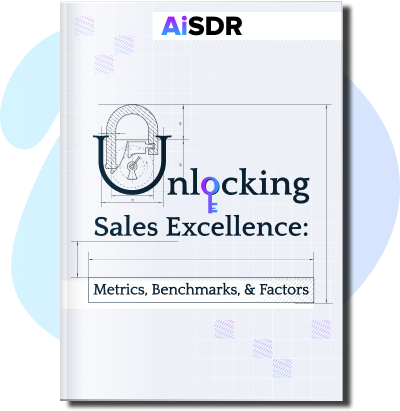Best AI Tools for Writing Different Types of Sales Copy

Find out the best AI-powered tools for writing sales copy
Sales copy can make or break a deal. The words you use impact your ability to connect, persuade, and close, but writing all copy from scratch is time-consuming and (if we’re being honest) mentally draining.
Enter AI sales tools. These streamline your writing process, allowing you to create compelling, high-converting sales copy in minutes rather than hours.
We’ll break down what makes good sales copy, introduce the best AI writing tools for different types of copy, and help you choose the right ones to suit your specific needs.
What makes a good sales copy?
So what exactly makes a good sales copy?
The short answer is you’re weaving together words and copywriting techniques that resonate with your readers while delivering value to them.
For the long answer, here’s a checklist of the key elements that make up good sales copy:
A compelling headline
A headline is often the first (and sometimes the only) thing potential customers read. And they’re likely to move on if it doesn’t grab their attention immediately.
The headline must compel the readers to continue, so it’s critical to get it right. A great headline is clear, concise, and promises a benefit or solution that directly appeals to the audience’s needs. It should arouse curiosity or promise a key takeaway that encourages people to read more.
A quick example: “Unlock the Secret to Effortless Skin Care” is much more engaging than “Our New Skin Care Products Are Available Now.”
A focus on benefits, not features
One of the most common mistakes in sales copy is focusing on product features instead of benefits. Features explain what a product is, while benefits highlight how it can improve the customer’s life.
Sales copy should speak to the emotional and practical rewards of using the product or service rather than just listing specifications.
Reframe “Our camera has 20 megapixels” as “Capture every precious moment in stunning detail with 20 megapixels of clarity.”
This approach helps people imagine how the product will directly enhance their lives.
Know your audience
Effective sales copy is tailored to its audience. Understanding your target demographic is essential for crafting a message that resonates.
What are people’s desires, pain points, and motivations? Do they seek convenience, luxury, efficiency, or security? The more you understand your audience, the more you can frame your copy in a way that speaks to their needs.
Using language and tone appealing to your specific customers – mid-career professionals, stay-at-home parents, or young tech enthusiasts – will make the message feel personal and relevant.
Clear call to action
A CTA is a direct prompt that tells the reader what to do next. Without it, even the most persuasive sales copy can fall flat. A good CTA is actionable and crisp. It should guide the reader toward the desired action: making a purchase, signing up for a trial, or subscribing to a newsletter.
CTAs should create urgency and be easy to follow.
Phrases like “Shop now,” “Claim your discount,” or “Join today” are clear and direct.
Adding a sense of urgency – “Limited time offer” or “Only 3 left in stock” – can further encourage immediate action.
Social proof and trust signals
Trust is a critical component of the sales process. Potential customers are more likely to take action when they see that others have had positive experiences with your product or service.
Social proof (e.g. testimonials, user reviews, or case studies) can make your sales copy much more credible. Including real customer stories or data-backed results reassures readers that they are making a sound decision. Trust signals, like certifications, money-back guarantees, or security badges, can also alleviate concerns about purchasing.
Persuasive, emotion-driven language
People don’t buy products based on logic alone. They buy on emotion. Great sales copy appeals to feelings. Using language that evokes happiness, excitement, or relief can prompt action.
Describing the emotional impact of the product can connect with the reader on a deeper level.
Instead of simply saying, “Our mattress is comfortable,” say, “Experience the best night’s sleep of your life and wake up feeling refreshed, every day.”
Emotional language helps people visualize their lives after purchasing the product and moving forward with the decision.
Concise and focused content
In the digital age, people are flooded with information and have limited attention spans. If your sales copy is too long or packed with jargon, you risk losing your audience’s attention before you even get to the main point.
Great sales copy is concise, focusing on the most important information without overloading the reader.
Every word should serve a purpose, guiding people toward making a decision.
Use short sentences, bullet points, and clear formatting to get an easily digestible copy.
Scarcity and urgency
The psychology of scarcity plays a powerful role in motivating customers to act quickly. When people perceive a limited opportunity, they feel more compelled to act before it’s too late. Sales copy that creates urgency can significantly increase conversion rates.
Highlighting time-sensitive offers, limited availability, or flash sales encourages immediate action.
Phrases like “Sale ends in 24 hours” or “Only 5 items left in stock” can trigger a sense of urgency.
Use of subheadings and formatting
Long blocks of text can feel overwhelming. It’s best to break your copy into smaller, digestible sections. Subheadings outlining key benefits, bullet points, and short paragraphs make the copy more structured and propel readers through the message.
Good sales copy is a blend of understanding your audience, delivering value, and creating an emotional connection.
The right AI email writing tools will help you create not just good but great sales copy.
Best AI tools for each type of sales copy
Some tools excel at creating compelling emails, while others are best for landing pages or social media content. To save you time and effort, we’ve compiled a list of the best AI tools for sales copy. This section will highlight the strengths of each tool and how they can streamline your sales process.
Emails
A key part of your sales process, sales emails help you connect with prospects, follow up on leads, and keep potential customers engaged. Let AI tools do the heavy lifting: write customized messages matching your tone and even figure out the best time to send them.
AiSDR
Whether it’s inbound outreach, cold outbound, follow-ups, nurture emails, demo confirmations, or replies, AiSDR can do it all. AiSDR combines proven email frameworks with success scripts from sales leaders to create value-packed email copy. It can also replicate your tone and writing style, allowing you to use it to scale your outreach, or you can run A/B tests to see which messaging works best.
AiSDR starts at $750 per month for 1,000 emails, with discounts for greater volume.
Lavender
Creating hyper-personalized sales emails that improve open and reply rates is probably Lavender’s biggest strength. Real-time feedback with tone, clarity, and structure tips helps fine-tune your message as you type.
At a starting rate of $27 per month, you gain access to premium features like unlimited emails, personalization, and AI recommendations.
Proposals
A strong proposal often decides whether you close a deal. Or lose it.
However, creating one from scratch takes time. That’s where AI tools come in.
PandaDoc
PandaDoc can quickly build professional, visually appealing proposals with smart templates and AI-generated content. Clients can review, approve, and sign documents all in one place, which adds convenience.
With monthly plans starting at $19, you get unlimited document uploads, e‑signatures, rich media drag-and-drop editor, and real‑time tracking and reporting.
Better Proposals
Better Proposals takes the guesswork out of proposal writing. With ready-made templates and AI-powered content suggestions, you can create persuasive, professional proposals in a fraction of the time. Plus, it gives you real-time insights into how prospects interact with your proposal, so you’ll know exactly when to follow up.
With an affordable starting rate of $19 per month, you can create engaging, convincing proposals much faster.
Presentations
Sales presentations are core for making pitches, running demos, and getting buy-in from stakeholders. These AI tools speed up the creation of compelling, visually appealing presentations.
Beautiful.ai
Beautiful.ai can create a sleek presentation in minutes. Its AI-driven design engine automatically arranges content into clean, neat slides, making it perfect for sales teams needing persuasive pitch decks.
At the initial price of $12 per month, you gain access to unlimited slides, AI content generation, viewer analytics, and an inspiration library.
Pitch
Pitch combines design, collaboration, and AI content generation. It’s the perfect tool for sales presentations that need input from multiple team members. With Pitch, your team can create presentations that don’t just look nice but also tell a compelling story.
At $20 per month, the starter plan allows small teams to quickly create on-brand decks.
Sales enablement material
Sales enablement materials, like ebooks and brochures, help educate and nurture prospects. These AI tools put together valuable resources in no time, allowing you to focus on engaging your leads.
Copy.ai
Copy.ai is perfect for generating long-form sales materials like ebooks, guides, and brochures. It’s ideal for building informative resources without spending hours on creating content.
Starter plans at $49 per month provide individual access to unlimited projects and words in chat.
Jasper
Jasper is a go-to AI writing tool for creating sales and marketing content like ebooks, one-pagers, and brochures. It generates high-quality sales materials matching your brand voice.
You can start with the rate of $39 per month, which gives you access to one user seat, brand voice customization, Jasper Chat, and a browser extension to take your AI-powered writing everywhere.
Social media content
Having a strong presence on social media isn’t just a nice-to-have; it’s essential for building brand awareness and fostering customer engagement.
And it requires consistent, daily effort. Fortunately, AI tools can make managing social media content much easier, faster, and more effective.
Buffer’s AI Assistant
Level up your social media strategy by allowing Buffer’s AI Assistant to take over tasks like brainstorming creative captions and scheduling content. This smart tool empowers social media marketers to create scroll-stopping posts in record time.
For only $5 per month, you can access unlimited scheduled posts per channel, an engagement inbox, and other basic features.
Hootsuite’s OwlyWriter AI
Hootsuite’s OwlyWriter AI provides an all-in-one solution for creating and scheduling social media content. It generates posts, hashtags, and captions, helping businesses maintain a consistent presence online.
The professional plan at a starting price of $99 per month allows you to work on ten social accounts and schedule unlimited posts. You also get best-time-to-post recommendations, custom analytics, and an AI caption, hashtag, and ideas generator.
Case studies
Case studies are extremely effective for building trust and credibility. By sharing real-world success stories, you show potential customers the tangible value of your work. Writing these stories? It can get tedious. These AI tools simplify the process, highlighting outcomes, showcasing your impact, and connecting with your audience on a personal level.
Surfer AI
Surfer AI’s pre-built templates and guided content optimization let you quickly craft clear, persuasive case studies that rank well on search engines. Relying on data-driven insights, the tool structures your case studies for maximum impact and visibility.
With prices starting at $79 per month, Surfer AI provides access to content creation, SEO optimization, and audit.
Writesonic
Telling powerful customer success stories just got easier! With Writesonic’s ready-to-use templates and customizable options, you can tailor each case study to your unique style and goals. Plus, it integrates with CRM tools, making it easy to gather customer data.
At $20 per month, the basic plan offers unlimited content generation, including PDFs, webpages, images, and audio.
Call scripts
Effective call scripts keep sales conversations on track and increase the chances of closing deals. With the power of AI, sales teams can create personalized, adaptable scripts that keep conversations flowing smoothly.
Regie.ai
Regie.ai empowers sales teams to generate and customize call scripts in real time. No matter how the conversation goes, reps can adjust their messaging on the spot with AI-driven suggestions that keep the discussion relevant and engaging.
Regie’s AI agents cost $50k per use case, no matter the team size.
Chorus
Imagine having a coach for every sales call. That’s exactly what Chorus provides. This AI-powered conversation analytics platform helps sales teams sharpen their messaging, refine call scripts, and turn every conversation into a learning opportunity. With real-time feedback and powerful AI insights, your team stays focused, confident, and ready to close more deals.
You’ll need to contact ZoomInfo to get the pricing of Chorus plans.
Landing pages
A high-converting landing page is a secret instrument for capturing leads and driving sales. But creating one from scratch can take time (unless you have AI on your side 😉). These smart tools help you craft persuasive landing pages, fast.
Unbounce’s Smart Copy
Unbounce’s Smart Copy creates attention-grabbing landing page content in minutes. Its AI-powered engine generates headlines, body copy, and CTAs designed to capture interest and drive conversions. You can customize the tone, messaging, and style to match your brand.
Get essential features like templates, content in multiple languages, and Chrome extension for $9 per month.
Scalenut
Scalenut takes the hassle off of creating landing pages that look great and also drive conversions. This AI-powered platform helps craft persuasive headlines, benefit-driven copy, and clear CTAs. Plus, its built-in SEO features ensure your pages are easy to find on search engines, driving more traffic to your site.
Scalenut’s plans start at $25 per month, giving you access to AI-powered content creation, SEO tools, and customizable templates.
LinkedIn and text messages
Personalized outreach via LinkedIn and text messages can significantly improve your response rates and strengthen connections. With AI tools, sales teams can write follow-ups that feel natural, relevant, and timely.
AiSDR
AiSDR takes LinkedIn and text message outreach to the next level with its ability to create contextual follow-ups. Each message references past interactions, making the conversation feel consistent and personal.
AiSDR’s secret sauce is its context-aware responses: quick, human-sounding messages that strengthen connections and drive results.
Dripify
Dripify simplifies lead nurturing on LinkedIn with automated messaging sequences. Its personalization and tracking features ensure that every message is tailored to your prospects and sent at the right time.
The starting plan, priced at $39 per month, gives access to basic features like advanced dashboard and reports, complete performance automation, and A/B testing.
Now that we’ve explored the best AI tools for different types of sales copy, let’s talk about choosing the right AI tool for your needs.
How to choose the right AI tool
Here’s a quick guide to help you select the AI tool that matches your needs.
Define your needs
Start by identifying your most time-consuming tasks and areas that could benefit from automation. If you’re in sales, consider the types of sales copy you create most frequently.
Do you spend hours writing personalized emails, product descriptions, or ad copy?
Pinpoint the areas that are unfulfilling or repetitive. These are ideal tasks to delegate to AI. For example, if writing cold outreach emails is a pain point, an AI-driven sales development representative like AiSDR could be the right solution.
Evaluate features
Once the needs are clear, evaluate the features of potential AI tools. Key capabilities to look for include:
- Personalization: Does the tool let you customize messages, content, or output?
- Ease of use: Is the interface intuitive and user-friendly?
- Integration: Can it integrate with your existing tools: CRM systems, email platforms, or project management software?
- Formatting: Does the tool provide proper formatting, templates, or pre-built prompts to streamline your work?
- Analytics and reporting: Can the tool audit how effective its output is?
For instance, if you’re considering an AI email assistant, you’ll probably want a tool that can pass performance checks, as well as personalize subject lines, vary message tone, and integrate with your email platform.
Get trials and demos
The best way to understand an AI tool’s capabilities is to try it yourself.
Most vendors offer free trials or live demos. Use this opportunity to test the tool’s functionality, ease of use, and alignment with your business needs.
During the demo, try asking about specific features and test real-world use cases relevant to your work. A hands-on trial often provides deeper insights than online reviews alone.
Consider your budget
AI tools come in different price ranges, so you should confirm that the cost is worth the value they deliver.
Ask yourself these questions:
- Does the time saved justify the cost?
- Can I reallocate resources toward higher-value activities?
- Will this tool generate a positive return on investment (ROI) in the short or long term?
Let’s use AiSDR as an example.
Does the time saved with AiSDR justify the cost?
Prospecting, researching, personalizing, and sending an email can take 20 to 30 minutes per message. In an eight-hour workday, that’s 16-24 emails sent, and if it’s outbound, there’s a relatively low chance of a response. AiSDR can automate much of this process – identifying leads, personalizing emails, and staggering sends – in minutes.
Does AiSDR let me reallocate resources toward higher-value activities?
Yes. Since sales reps don’t need to spend time creating and sending personalized emails, the time saved can be repurposed to allow sales reps to focus on revenue-driving tasks like demos, closing deals, and calls.
Will AiSDR generate a positive return on investment in the short or long term?
Whether this occurs or not depends on several factors:
- Your business and its products
- Your pricing model
- Your product-market fit
AiSDR was designed not to fully replace sales reps, but rather to make it easier to double-down on high-performing salespeople. So if you don’t have all three figured out, AiSDR probably won’t help you.
But if you have ironed out all three, especially product-market fit, then AiSDR is proven to generate positive returns in the short and long run.











